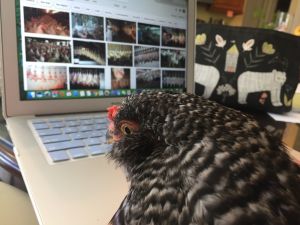Before being a vegetarian became socially accepted as it is today, elementary, middle and high school were tough times. In fact, I have heard almost all of the names and have been asked all of the questions in the book. I’ve even had the pleasure of having bacon thrown at me during a school lunch. The best part about all of it looking back is that I never even spoke out to classmates about being a vegetarian. Rather, it was discovered, and I was ridiculed.
Being the target of everyone’s jokes came with the territory of being a vegetarian at such a young age. If I had a penny for every time I heard, “We are MEANT to eat meat…our ancestors always have!” Sometimes I feel the urge to inform that many human ancestors were actually vegetarian, however, I know what would happen if I did. Even though I would be explaining the lifestyle, I would be blacklisted.
Growing up as a vegetarian in an omnivorous and carnivorous household was NOT easy. I grew up in an almost even split of Italian and German family. As you can imagine, holiday meals, as well as daily meals, were always filled with meat. If it wasn’t the “star” of the dish, it was in the sauce, or in the broth. To put it simply, I lived on rice.
When I was in 4th grade, I decided to become a vegetarian. A vegetarian is someone who does not eat meat from anything that was once living. Which differs from that of a pescatarian, who eats fish and seafood. A vegan is someone who does not eat any products that were derived from animals.
Being a vegetarian is a lifestyle choice for myself that is still true to this day. There are many reasons an individual would decide to become a vegetarian. The two most popular reasons for becoming a vegetarian are animal rights and health benefits.
Animal rights are the reason I initially made the choice to become a vegetarian. To me, eating meat never seemed like it was a fair trade for something to give their life. Especially with all of the alternative options available today.
The options available at restaurants, grocery stores, cafes, coffee shops and even gas stations has grown immensely from 12 years ago, when I became a vegetarian. According to a study by the research firm Global Data, vegeanism in America increased by 600 percent since 2014. I remember when I would go out previously for meals, I would only have the option of the house salad or a fruit cup. Now, there are menus and establishments dedicated to this diet, this movement.
The other popular perspective for becoming a vegetarian are the associated health benefits for your body and for your planet. Heart disease and cancer are the top two leading causes of death in the United States. In fact, the two are responsible for 46 percent of deaths.
Vegetarians are 40 percent less likely to develop cancer, compared to that of carnivores. This is due to vegetarian

diets being naturally low in saturated fat, high in fiber, and well supplied with cancer-protective phytochemicals. Additionally, when you’re vegetarian, you’re avoiding the animal fat linked to cancer altogether. As far as heart disease goes, vegetarian diets avoid saturated fats and cholesterol. In addition, the fiber from a vegetarian diet helps to reduce the levels of cholesterol in the human body.
It is thought that the “simplest and cheapest thing anyone can do to reduce the human impact on the environment is to eat less meat.” In eating meat, humans are overheating our planet, using up our land, using too much water, deforestation, surpasses oil in production, poisoning our earth and polluting the oceans and air.
At the end of the day, I will NEVER force my friends, my family or even my children to be a vegetarian. Life is about choices. I do, however, believe individuals should be well informed in order to make them. That is why I am so passionate about being a vegetarian. Knowledge is power.



